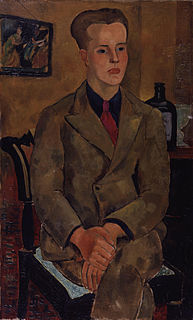A Quote by V. S. Pritchett
The difference between farce and humour in literature is, I suppose, that farce strums louder and louder on one string, while humour varies its note, changes its key, grows and spreads and deepens until it may indeed reach tragic depths.
Related Quotes
The myriad-minded man, our, and all men's, Shakespeare, has in this piece presented us with a legitimate farce in exactest consonance with the philosophical principles and character of farce, as distinguished from comedy and from entertainments. A proper farce is mainly distinguished from comedy by the licence allowed, and even required, in the fable, in order to produce strange and laughable situations. The story need not be probable, it is enough that it is possible.
If melodrama is the quintessence of drama, farce is the quintessence of theatre. Melodrama is written. A moving image of the worldis provided by a writer. Farce is acted. The writer's contribution seems not only absorbed but translated.... One cannot imagine melodrama being improvised. The improvised drama was pre-eminently farce.
Probably there is an imperceptible touch of something permanent that one feels instinctively to adhere to true humour, whereas wit may be the mere conversational shooting up of "smartness"--a bright feather, to be blown into space the second after it is launched...Wit seems to be counted a very poor relation to Humour....Humour is never artificial.
To describe love-making is immoral and immodest; you know it is. To describe it as it really is, or would appear to you and me as lookers-on, would be to describe the most dreary farce, to chronicle the most tautological twaddle. To take note of sighs, hand-squeezes, looks at the moon, and so forth--does this business become our dignity as historians? Come away from those foolish young people--they don't want us; and dreary as their farce is, and tautological as their twaddle, you may be sure it amuses them, and that they are happy enough without us.
You hear people talking about a Scottish sense of humour, or a Glaswegian sense of humour, all sorts of countries and cities think that they've got this thing that they're funny. I read about the Liverpudlian sense of humour and I was like, 'Aye? What's that then?' You get that and you especially hear about a dark Glaswegian sense of humour.
The British have turned their sense of humour into a national virtue. It is odd, because through much of history, humour has been considered cheap, and laughter something for the lower orders. But British aristocrats didn't care a damn about what people thought of them, so they made humour acceptable.





































